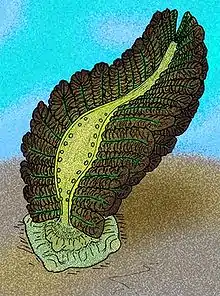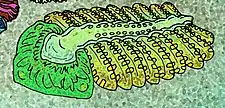| Bomakellia Temporal range: | |
|---|---|
 | |
| Bomakellia kelleri, restored as a rangeomorph | |
| Scientific classification | |
| Domain: | Eukaryota |
| Kingdom: | Animalia |
| Phylum: | †Petalonamae |
| Family: | †Charniidae |
| Genus: | †Bomakellia Fedonkin, 1990 |
| Species: | †B. kelleri |
| Binomial name | |
| †Bomakellia kelleri Fedonkin, 1985[1] | |

Bomakellia kelleri is a species of poorly understood Ediacaran fossil organism represented by only one specimen discovered in the Ust'-Pinega Formation of the Syuzma River (in Arkhangelsk Oblast, Russia) from rocks dated 555 million years old. Bomakellia was originally interpreted as an early Arthropod.[1] A study by B. M. Waggoner even concluded that the organism was a primitive anomalocarid and erroneously identified the ridges of supposed Cephalon as being eyes making Bomakellia the oldest known animal with vision.[2] But this hypothesis has not reached acceptance, nor acknowledgement.[3][4]
A closer examination of the specimen has identified a tetraradial symmetry in the body, and a frond-like morphology which closely resembles that of Rangea – the current interpretation of Bomakellia is as a rangeomorph frond, which could possibly mean that it's closely related to the Chinese Paracharnia.[5]
See also
References
- 1 2 M. A. Fedonkin (1985). "Systematic Description of Vendian Metazoa". Vendian System: Historical–Geological and Paleontological Foundation. Moscow: Nauka. 1: Paleontology: 70–106.
- ↑ B. M. Waggoner (1996). "Phylogenic Hypotheses of the Relationships of Arthropods to Precambrian and Cambrian Problematic Fossil Taxa". Systematic Biology. Systematic Biology, Vol. 45, No. 2. 45 (2): 280–293. doi:10.2307/2413615. JSTOR 2413615.
- ↑ McMenamin, Mark A. S. (1998). The Garden of Ediacara. New York: Columbia University Press. ISBN 978-0-231-10559-0.
- ↑ Fryer, G. (1999). "Cambrian animals: evolutionary curiosities or the crucible of creation?". Hydrobiologia. 403: 1–11. doi:10.1023/A:1003799411987. S2CID 21020029.
- ↑ Dzik, J. (2002). "Possible ctenophoran affinities of the precambrian "sea-pen" Rangea". Journal of Morphology. 252 (3): 315–334. doi:10.1002/jmor.1108. PMID 11948678. S2CID 22844283.